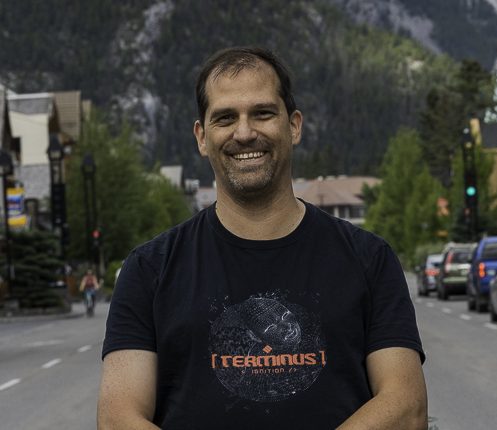
Notanee Bourassa
NASA Citizen Scientist
I have always fostered a love for the night sky, due, in part, to my grandfather who was a professor at the University of Regina, and also due to the lure of imagination that Carl Sagan spoke of in describing the universe in the TV series "Cosmos."
My father introduced me to the early electronic music of Tomita, Vangelis, and Laurie Anderson. Also, the influence of the "Star Wars" and "Star Trek" movies, which were released when I was about five years old.
All of this propelled me forward into an interest in space, stars, planets and so much more. I love science. If I could contribute in any way, I wanted to be a part of something bigger than myself. Being a citizen scientist with NASA is one fantastic avenue to do that.
Sitting under the night sky with my Nikon full-frame camera targeted on auroras! The aurora reminds me how the human race is a mere tenant on a rock in the vast emptiness of space. What protects us from the Sun and allows life? Well, our magnetic shield does that. Auroras are just a visual way to remind humans that it's there [Earth's magnetic field], due to fantastic physics.
When I'm not out shooting the night sky, I work to help provide telecommunications and entertainment systems to the province of Saskatchewan, Canada. I work during the daytime wrestling with routers, switches, and other equipment and routers and routing protocols.
I have learned that I am not alone and that there are many who also aspire to be a part of something bigger than themselves. This kinship affords some acceptance in what otherwise seems like a very lonely hobby.
Innocent curiosity and much of what was in my response to the first question.
Balance and moderation – employ them both., You can contribute much, just not as fast as you expect yourself to deliver. Otherwise, you might burn out. Make a schedule, consult with your partner if you have one, and agree!
Science fiction and fantasy movies inspire me the most to push myself to know more about the universe. People like Dr. Tamitha Skov and Elizabeth MacDonald inspire me to know that tangible changes are possible through science, and higher knowledge through the scrutiny of proper, unbiased scientific processes. I love it all.
- I am blind in my right eye due to an injury I suffered in the Royal Canadian Navy (RCN). I have served two tours in the Middle East, enforcing sanctions against Iraq.
- I have twin boys, plus another son and a beautiful daughter.
- I Deejayed "industrial music" on CJTR 91.3-FM in Regina, Saskatchewan, for 15 years.
- I am a professional drone flyer with professional cameras.
- I am a professional second shooter wedding photographer.
- I am a storm chaser – every year I chase tornadoes in tornado alley from Texas to Saskatchewan and everywhere in between.
- I exited the RCN after ten years and received two special service medals for peacekeeping. I have circumnavigated the world, old school, on a warship.
- I have been initiated by King Neptune and am a member of the exalted Shellbacks.
- I also do cosplay for children's parades. From Jack Sparrow ("Pirates of the Caribbean") to Kevin Flynn ("Tron"), to Darth Maul ("Star Wars")
Planetary science is a global profession.

